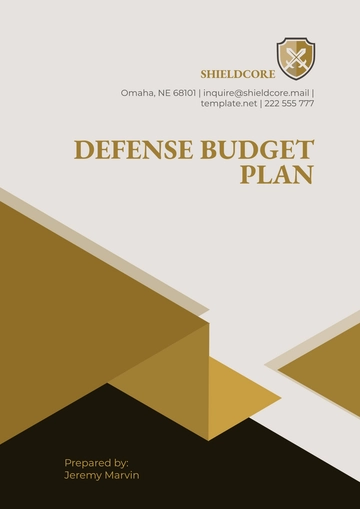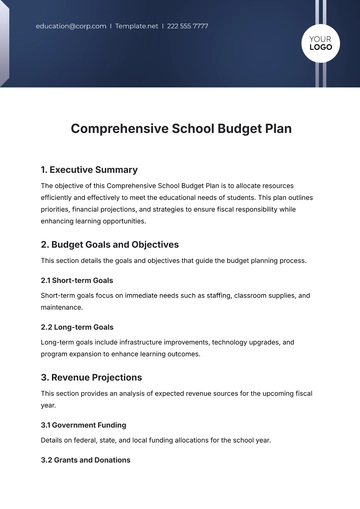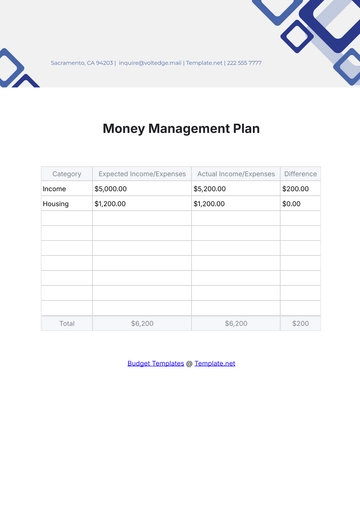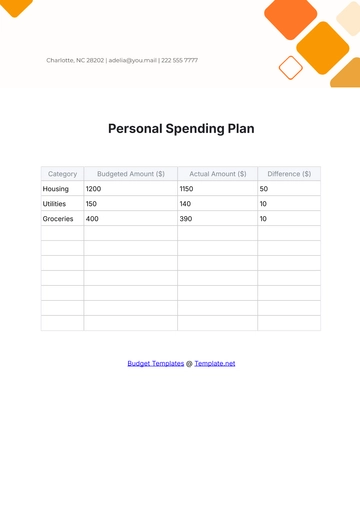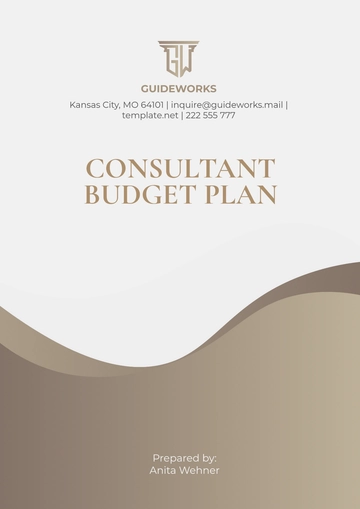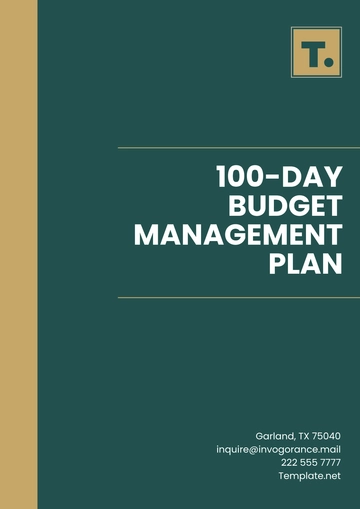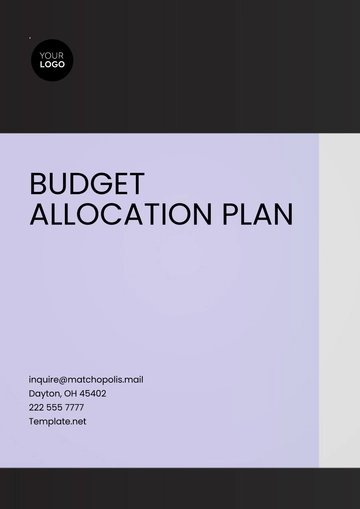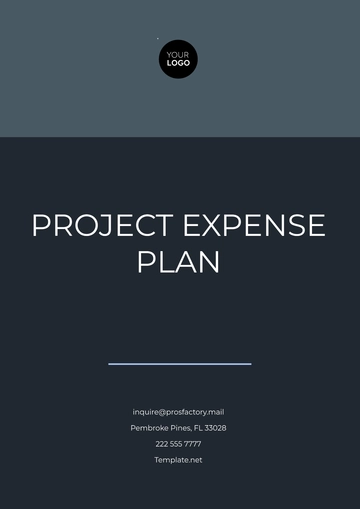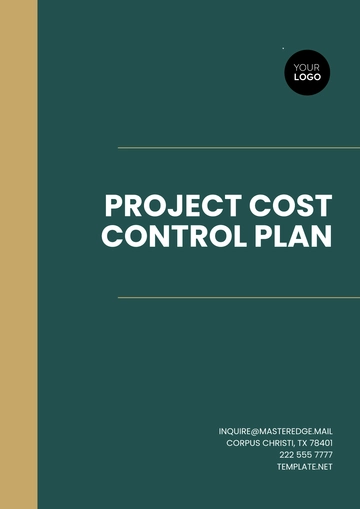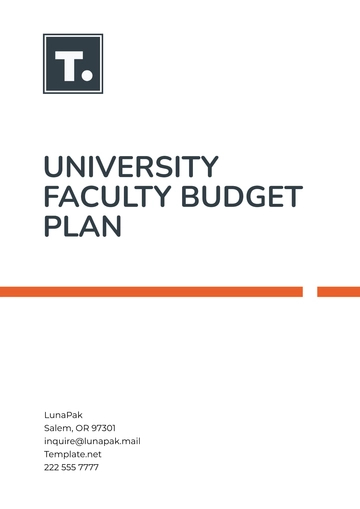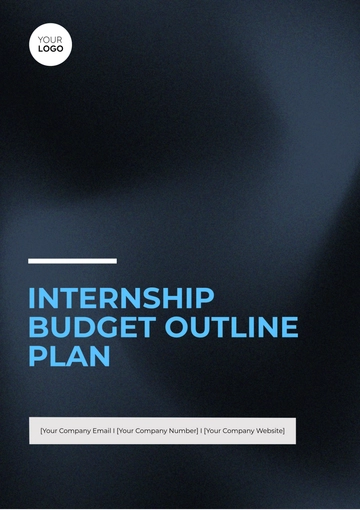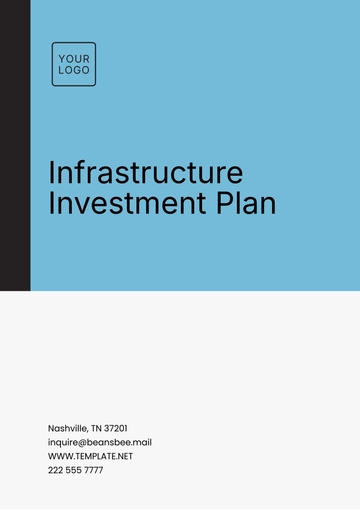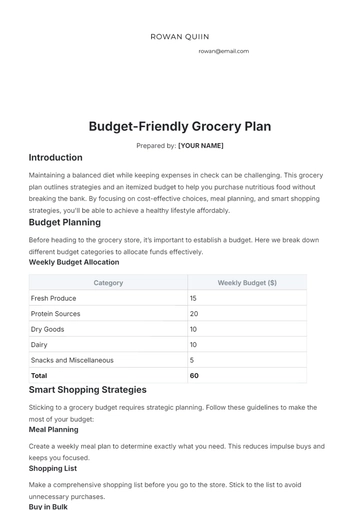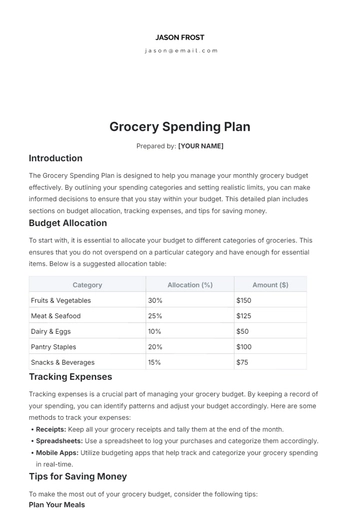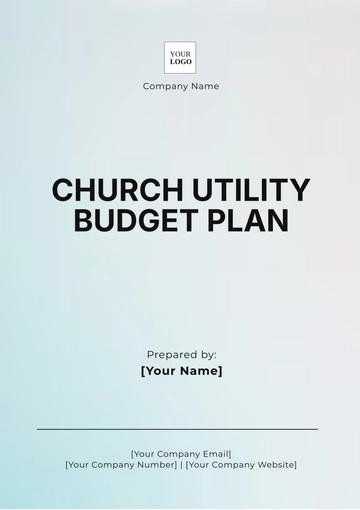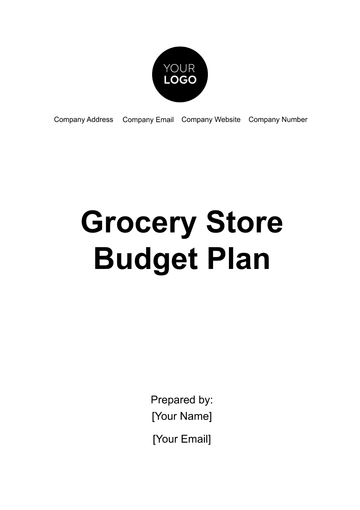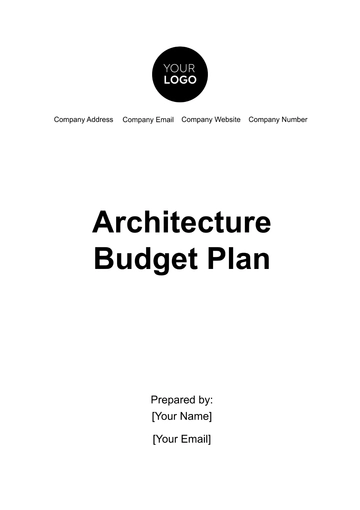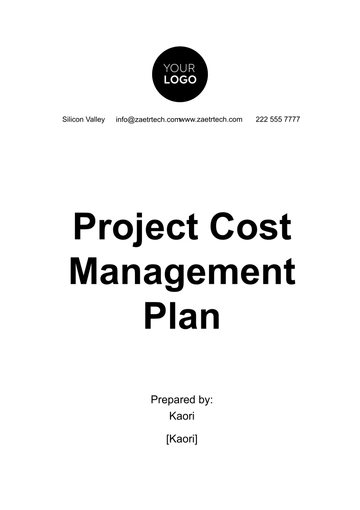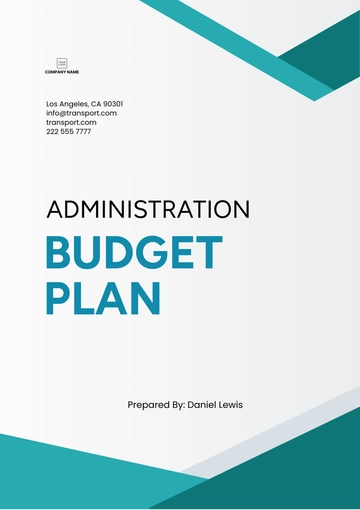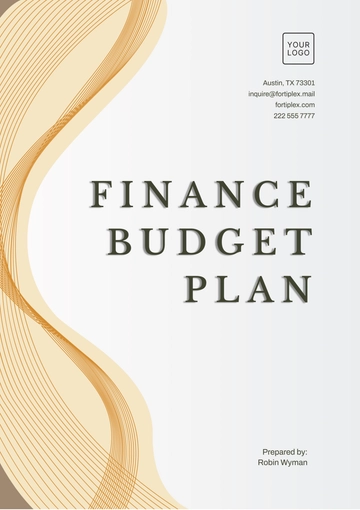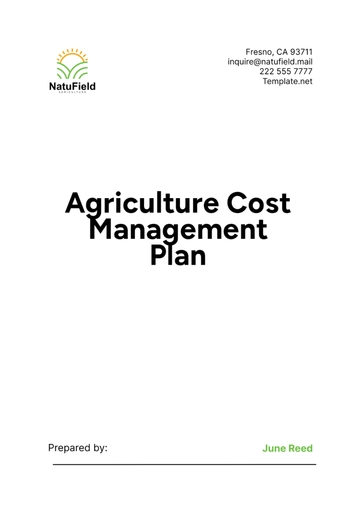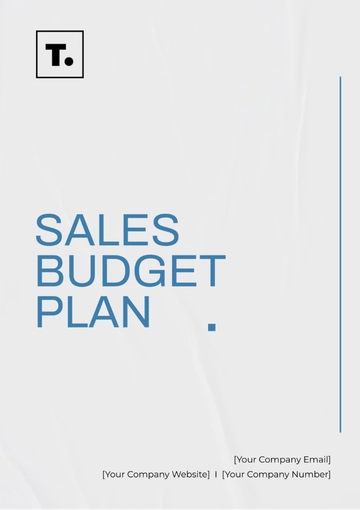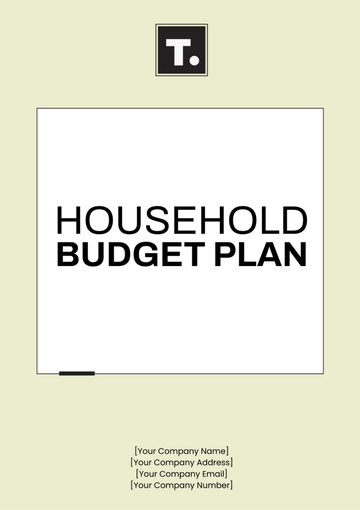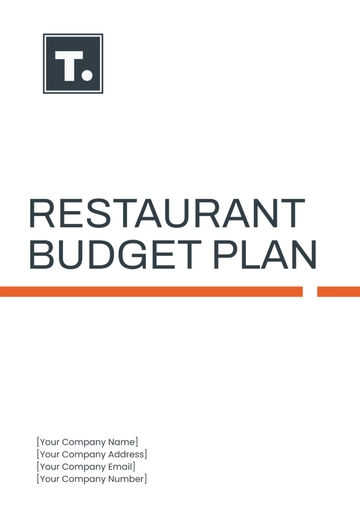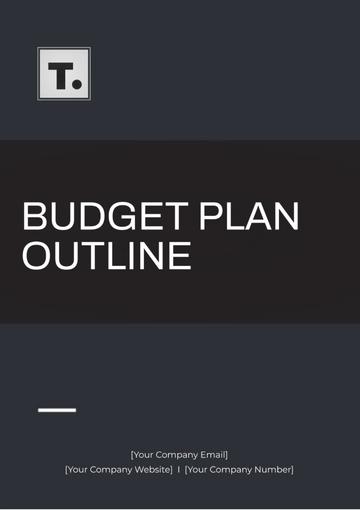Free Consultant Budget Plan
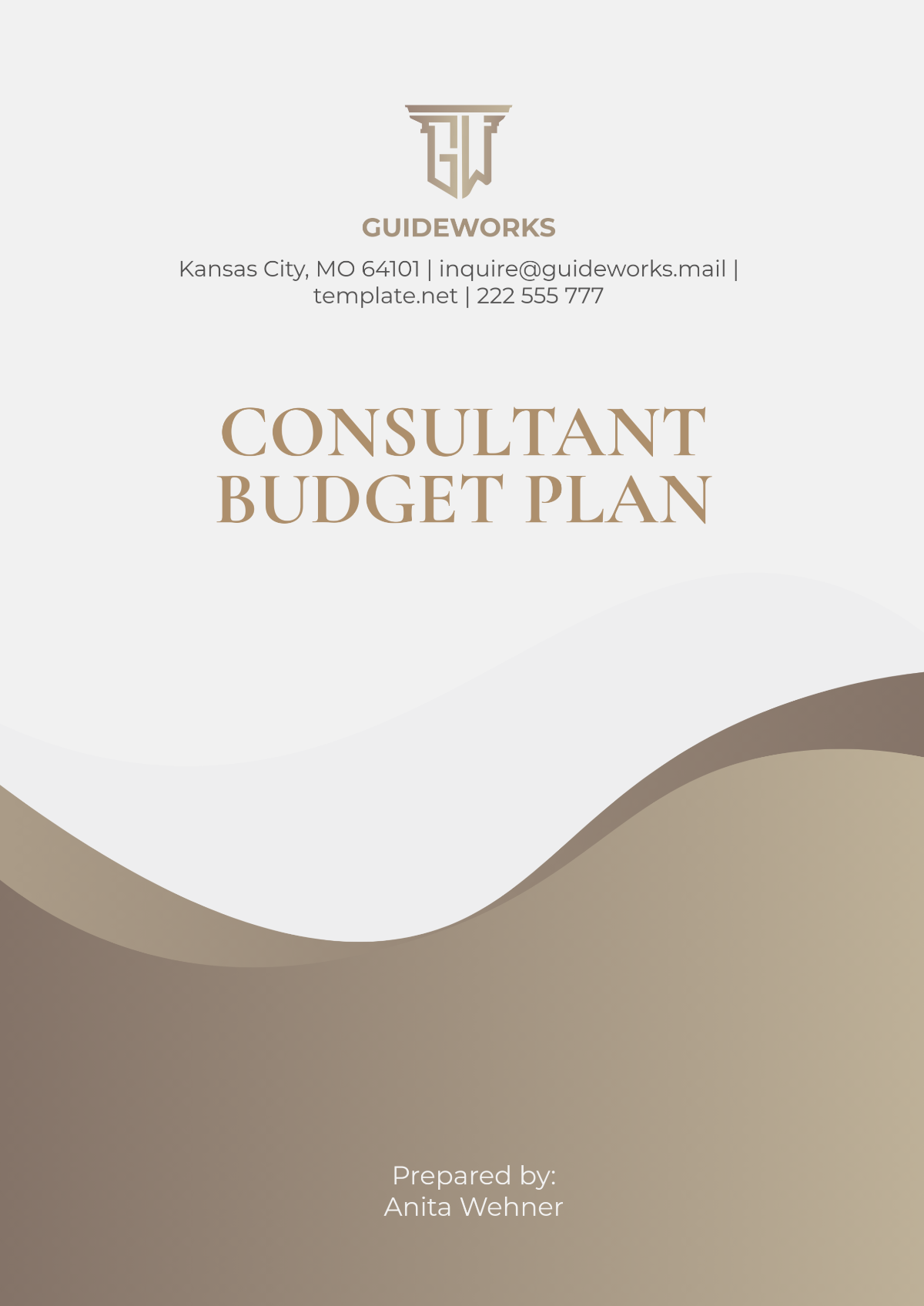
I. Introduction
A Consultant Budget Plan is a vital financial document that outlines and forecasts the costs associated with engaging external experts to address specific business needs, initiatives, or projects. For [Your Company Name], this plan serves as a guiding framework to manage and track consulting expenses effectively while ensuring alignment with broader organizational goals. As businesses expand and encounter more complex challenges, the need for specialized expertise grows, making consultants an essential resource. The Consultant Budget Plan will ensure that these external resources are utilized efficiently, providing high value without exceeding financial constraints.
This document outlines a comprehensive approach to budgeting for consultants, covering key areas such as:
Consultant Engagement Fees – Defining the various types of consultants, their roles, and the fees associated with their services.
Project-Related Expenses – Projecting additional costs such as materials, resources, and equipment needed for consultants to deliver their services.
Travel and Accommodation Costs – Estimating the expenses involved for consultants who need to travel for the assignment.
Contingency Fund – Setting aside a contingency amount to cover unexpected costs or project modifications.
Cost-Benefit Analysis – Evaluating the anticipated return on investment for each consulting engagement.
This plan provides a well-rounded financial structure to ensure that consultants contribute effectively to [Your Company Name]'s strategic objectives for 2050 and beyond. It also helps establish clear financial parameters to avoid budget overruns, ensuring that each investment in consulting services provides a measurable benefit.
II. Consultant Engagement Fees
Consultant fees represent a significant portion of the overall consultant budget, and as such, they require careful planning and management. These fees vary based on the expertise required, the duration of the engagement, and the complexity of the tasks assigned. In this section, we break down the various consultant roles within [Your Company Name] and their associated costs.
A. Types of Consultant Roles and Responsibilities
There are several distinct roles consultants can take on in an organization. Each type of consultant offers a unique set of skills tailored to specific business functions. Understanding these roles ensures that [Your Company Name] engages the right consultants for the right projects.
1. Strategic Consultants
Strategic consultants are hired to help guide long-term business direction, ensuring that [Your Company Name] remains competitive and forward-thinking. Their responsibilities typically include market analysis, business planning, operational efficiency improvements, and overall strategy development.
They often work closely with senior management to deliver high-level recommendations and action plans. These consultants usually have extensive industry experience and provide insights that can reshape the business’s approach to future growth.
Expected Deliverables: Strategic roadmaps, market analysis reports, executive summaries, and business plans.
Estimated Fee: Strategic consultants are usually more expensive due to their high-level expertise and the value they provide in shaping long-term organizational strategies.
2. Technical Consultants
Technical consultants are specialists in specific technical fields such as IT, software development, engineering, or systems integration. Their role is to apply their technical knowledge to solve problems or create new systems for the business.
They may work on IT system upgrades, software deployments, or process automation. These consultants are often hired for their deep understanding of specific technologies or engineering disciplines, which may not be readily available in-house.
Expected Deliverables: System designs, application development, technical specifications, and troubleshooting reports.
Estimated Fee: Technical consultants often charge based on the complexity of the work. For complex systems or projects, fees can be high due to the skills required.
3. Marketing and Branding Consultants
Marketing and branding consultants focus on improving a company's visibility in the market and developing strategies for customer engagement. These experts help [Your Company Name] with advertising campaigns, brand positioning, customer research, and digital marketing.
They analyze market trends, customer behavior, and competitive landscapes to guide decision-making. These consultants can also assist in creating marketing materials, defining target audiences, and measuring campaign effectiveness.
Expected Deliverables: Marketing campaigns, brand strategies, content calendars, and performance reports.
Estimated Fee: Fees depend on the campaign's scale and the complexity of the branding needs. Larger projects often involve longer-term engagements, contributing to higher costs.
4. HR and Organizational Development Consultants
HR and organizational development consultants focus on improving the human capital side of the business. They help with everything from recruitment and talent management to organizational design and employee development programs. Their goal is to improve overall organizational performance through human resources strategies.
They also help with leadership development, performance management, and employee engagement strategies. By addressing these internal factors, HR consultants play a critical role in driving long-term success through improved employee satisfaction and productivity.
Expected Deliverables: Leadership training programs, recruitment strategies, employee surveys, and performance management frameworks.
Estimated Fee: HR consultants usually charge based on project scope, typically taking on a fixed-rate model for large projects or an hourly rate for smaller assignments.
B. Estimated Consultant Rates
Consultant rates vary by expertise and the complexity of the project. Below is a table summarizing the average hourly and daily rates for different types of consultants based on current market standards.
Consultant Type | Hourly Rate ($) | Daily Rate ($) | Estimated Total Cost ($) |
|---|---|---|---|
Strategic Consultant | 250 | 2,000 | 50,000 |
Technical Consultant | 150 | 1,200 | 30,000 |
Marketing and Branding Consultant | 175 | 1,400 | 35,000 |
HR and Organizational Consultant | 125 | 1,000 | 25,000 |
These figures provide an estimate for consultant fees based on projected hours or days of work. It is important to account for these costs when planning the consultant budget, ensuring sufficient funds are allocated to each type of consultant based on their estimated contributions to the project.
III. Project-Related Expenses
Beyond consultant fees, there are several project-related expenses that must be considered. These additional costs can include materials, tools, software, and other resources that are necessary for consultants to perform their roles effectively. Accurately forecasting these expenses is critical to ensure that the overall project stays within budget.
A. Materials and Supplies
Consultants may require specific materials or resources to complete their tasks. For example, technical consultants may need licenses for software tools, while marketing consultants may require access to advertising platforms or market research data. In some cases, consultants will need to purchase industry reports or specialized hardware to support their work.
1. Software Licenses
Many consultants, especially in the fields of IT and marketing, will need access to specialized software. These tools are often licensed annually, and the costs can add up quickly, especially if several consultants require access to the same tool.
Software Type | Estimated Annual Cost ($) |
|---|---|
Project Management | 5,000 |
Data Analytics Tools | 7,500 |
Design/Marketing Tools | 4,000 |
2. Reports and Materials
Consultants may need to access or purchase reports, white papers, or studies that inform their work. For instance, a strategic consultant may need access to industry-specific market research, while a technical consultant might require technical documentation or manuals.
Material Type | Estimated Cost per Unit ($) | Quantity | Total Cost ($) |
|---|---|---|---|
Printed Reports | 100 | 10 | 1,000 |
Online Subscriptions | 500 | 5 | 2,500 |
B. Equipment and Resources
For specific projects, consultants may require temporary access to specialized equipment or resources that [Your Company Name] does not have in-house. This could include high-performance computing devices for technical consultants or design tools for branding experts. These resources will ensure that the consultants have the necessary tools to deliver the desired outcomes.
Equipment Type | Estimated Cost per Unit ($) | Quantity | Total Cost ($) |
|---|---|---|---|
High-performance Laptop | 2,000 | 2] | 4,000 |
Testing Equipment | 1,500 | 4,500 |
C. Miscellaneous Expenses
Additional miscellaneous expenses include items like phone and internet costs, office space rentals, or shipping materials. These costs are often unpredictable but should be accounted for as part of the project budget to avoid surprises.
Expense Type | Estimated Cost per Unit ($) | Quantity | Total Cost ($) |
|---|---|---|---|
Phone and Internet | 200 | 12 | 2,400 |
Temporary Office Space | 1,000 | 5 | 5,000 |
IV. Travel and Accommodation Costs
For projects that require consultants to travel, whether for on-site work or meetings, travel and accommodation expenses can be significant. Planning for these costs is essential to avoid overspending. This section will outline expected travel and accommodation expenses based on typical business travel.
A. Travel Costs
Consultants may need to travel by plane, train, or car depending on the project location. These expenses can be substantial, especially for international projects. Travel costs can vary depending on the consultant’s location, the urgency of the project, and the travel class.
Travel Type | Estimated Cost per Trip ($) | Frequency | Total Cost ($) |
|---|---|---|---|
Domestic Flights | 500] | 5 | 2,500 |
International Flights | 2,000 | 2 | 4,000 |
Car Rental | 100 | 10] | 1,000 |
B. Accommodation Costs
For longer-term assignments or when consultants are working in different cities or countries, accommodation expenses can add up quickly. These expenses depend on the consultant's preferences and the project's duration. Mid-range hotels are typically the most cost-effective option, but luxury accommodations might be necessary in certain situations.
Accommodation Type | Estimated Cost per Night ($) | Nights Stayed | Total Cost ($) |
|---|---|---|---|
Hotel (Mid-range) | 150 | 10 | 1,500 |
Luxury Hotels | 300 | 6 | 1,800 |
C. Per Diem and Miscellaneous
Consultants who are traveling may also incur daily expenses, including meals, transportation within the city, and other incidentals. These costs should be accounted for in the budget to ensure that consultants can be adequately supported during their stay.
Expense Type | Estimated Cost per Day ($) | Days Stayed | Total Cost ($) |
|---|---|---|---|
Meals and Incidentals | 75 | 16 | 1,200 |
V. Contingency Fund
A contingency fund is a crucial aspect of any consultant budget, as it accounts for unexpected changes in project scope, additional work, or unforeseen costs that may arise during the course of a consulting engagement. Having a contingency fund ensures that [Your Company Name] can effectively handle these potential deviations without disrupting the overall financial health of the project. It acts as a financial buffer to deal with uncertainties, particularly when consultants encounter unanticipated challenges or opportunities that require additional resources or time.
A. Importance of a Contingency Fund
Unexpected issues can often arise when working with consultants, especially in complex or fast-moving projects. These may include:
Scope Creep: The project’s scope may evolve as new requirements or opportunities are identified during the engagement.
Unforeseen Challenges: Consultants may encounter technical difficulties or issues that were not initially anticipated.
Resource Shortages: External factors, such as supply chain disruptions or delayed material shipments, may affect the availability of resources needed for the project.
A contingency fund can also account for changes in consultant fees. For instance, a consultant may need to adjust their hourly or daily rates depending on unforeseen complexities, additional hours, or extended project timelines. Having a contingency fund in place helps [Your Company Name] to respond to these challenges without significant financial disruption, ensuring that the project continues to move forward without delay.
B. Determining the Contingency Fund Size
The size of the contingency fund typically depends on the complexity and size of the project. A common practice is to allocate a percentage of the total projected consultant fees and associated costs. This percentage can vary based on several factors, such as project risk, uncertainty, and the experience of the consultants involved. For example, highly complex or long-term projects may warrant a higher contingency fund, while smaller or lower-risk projects may require less.
Low-Risk Projects: For relatively simple or straightforward projects, a contingency fund of [5-7]% of the total costs may be appropriate.
Medium-Risk Projects: Projects that involve moderate complexity, such as those requiring specialized knowledge or coordination between different teams, may benefit from a contingency fund of [8-10]% of the total costs.
High-Risk Projects: For high-complexity or highly dynamic projects, such as new product development or global expansions, a contingency fund of [10-15]% may be necessary.
In addition to these guidelines, it's important to periodically review and adjust the contingency fund based on ongoing assessments of project risks. By closely monitoring the project's progress, [Your Company Name] can determine whether additional resources are required or if the contingency fund needs to be adjusted to account for unforeseen changes.
C. Managing the Contingency Fund
Managing a contingency fund requires a disciplined approach to ensure that it is only used when absolutely necessary. [Your Company Name] should establish clear criteria for when the contingency fund can be accessed, ensuring that it is reserved for true emergencies or unplanned expenses.
Approval Process: Any expenditure from the contingency fund should go through a formal approval process. Typically, senior management or project leads should evaluate whether the additional costs are justified.
Tracking Fund Usage: It’s critical to track how the contingency fund is being utilized throughout the project. This tracking should be done in real-time, ensuring that any expenditures are documented and approved as part of the project budget.
Remaining Funds: At the end of the project, any unused contingency funds should be reviewed. These funds could be reallocated to future projects or be returned to [Your Company Name]'s general budget, depending on company policy.
D. Example of Contingency Fund Allocation
Consultant Type | Total Project Cost ($) | Contingency Percentage (%) | Contingency Amount ($) |
|---|---|---|---|
Strategic Consultant | 50,000 | 10 | 5,000 |
Technical Consultant | 30,000 | 8 | 2,400 |
Marketing Consultant | 35,000 | 5 | 1,750 |
HR Consultant | 25,000 | 7 | 1,750 |
In this example, the contingency amounts are calculated based on the total projected costs for each type of consultant. For instance, a strategic consultant engagement with an estimated total cost of [50,000] would require an additional [5,000] set aside as a contingency, representing 10% of the total cost. This amount provides a financial cushion in case any unforeseen costs arise.
VI. Cost-Benefit Analysis
A thorough cost-benefit analysis helps [Your Company Name] evaluate whether the investment in consultants will yield sufficient returns in terms of business value. This process involves comparing the total costs of hiring a consultant—both direct and indirect—with the expected benefits that the consultant’s work will bring to the organization. Conducting this analysis ensures that resources are being allocated effectively, with a clear understanding of the tangible and intangible value that each consultant provides.
A. Projected Benefits of Consultant Engagement
Consultants can provide several benefits to [Your Company Name], including:
Increased Efficiency: Consultants bring specialized knowledge and expertise that allow [Your Company Name] to streamline operations, optimize processes, and reduce inefficiencies.
Expert Insights: Consultants often provide industry-specific insights, allowing the company to make informed decisions that would be difficult to achieve internally due to lack of expertise or resources.
Cost Savings: By identifying areas where the company can reduce expenses or improve resource utilization, consultants can help [Your Company Name] achieve long-term cost savings.
Risk Mitigation: Consultants can provide a fresh perspective on potential risks and offer strategies for mitigating them, which is especially useful in uncertain or rapidly changing markets.
Revenue Growth: Strategic, marketing, and sales consultants can drive revenue by helping the company expand into new markets, improve customer acquisition strategies, or launch new products.
For example, a strategic consultant can develop a roadmap for entering new markets, which could result in increased revenue streams. A technical consultant might optimize IT systems, resulting in operational savings and better performance.
B. Quantifying Benefits: Return on Investment (ROI)
ROI is a critical metric in determining whether the benefits of hiring a consultant outweigh the costs. For each type of consultant, the ROI is calculated by comparing the estimated benefits (such as revenue growth, cost savings, or operational efficiencies) with the overall cost of hiring the consultant.
For instance, if a consultant’s work leads to an increase in annual revenue or productivity that is higher than the cost of their engagement, then the ROI is considered positive.
Example: Strategic Consultant ROI
If [Your Company Name] hires a strategic consultant to help enter a new market, and the result of their work is an increase in annual revenue by [20]% from the new market, the ROI can be calculated as follows:
Estimated Total Project Cost: [50,000]
Projected Revenue Increase: [100,000]
The ROI is [100]%, meaning the company would receive double the value of the investment in terms of additional revenue generated by entering the new market.
C. Calculating ROI for Other Consultant Types
For other consultants, such as technical or marketing consultants, ROI can be calculated in a similar manner. The key is to estimate the expected benefits (e.g., cost savings, increased revenue) and compare them with the associated costs of hiring the consultant.
Consultant Type | Total Cost ($) | Projected Benefit (%) | ROI (%) |
|---|---|---|---|
Strategic Consultant | 50,000 | 20 | 100 |
Technical Consultant | 30,000 | 15 | 50 |
Marketing Consultant | 35,000 | 10 | 25 |
HR Consultant | 25,000 | 5 | 10 |
For example, the technical consultant is projected to deliver a [15]% improvement in cost savings or operational efficiency, yielding an ROI of [50]% based on the project costs of [30,000].
VII. Conclusion
The Consultant Budget Plan for [Your Company Name] provides a comprehensive strategy to manage consultant-related costs while ensuring that external expertise is leveraged effectively to achieve business objectives. By understanding and forecasting consultant fees, project-related expenses, travel and accommodation costs, and the contingency fund, [Your Company Name] can keep projects within budget while also accounting for unexpected costs.
The inclusion of a detailed cost-benefit analysis ensures that each consultant engagement is evaluated against the expected returns, ensuring that investments in consulting services are aligned with the company's long-term goals and deliver tangible value. As we approach 2050 and beyond, having a well-structured consultant budget plan will enable [Your Company Name] to continue growing and adapting in an increasingly complex and competitive business environment. This approach allows the company to access top-tier expertise without compromising financial discipline, helping [Your Company Name] maintain a competitive edge while managing costs effectively.
- 100% Customizable, free editor
- Access 1 Million+ Templates, photo’s & graphics
- Download or share as a template
- Click and replace photos, graphics, text, backgrounds
- Resize, crop, AI write & more
- Access advanced editor
Keep track of project costs with the Consultant Budget Plan Template from Template.net. This editable and customizable template helps you manage expenses and allocate resources effectively. Tailor it using the AI Editor Tool to fit your project’s specific budget. Download now to maintain control over your consulting budgets.
You may also like
- Finance Plan
- Construction Plan
- Sales Plan
- Development Plan
- Career Plan
- Budget Plan
- HR Plan
- Education Plan
- Transition Plan
- Work Plan
- Training Plan
- Communication Plan
- Operation Plan
- Health And Safety Plan
- Strategy Plan
- Professional Development Plan
- Advertising Plan
- Risk Management Plan
- Restaurant Plan
- School Plan
- Nursing Home Patient Care Plan
- Nursing Care Plan
- Plan Event
- Startup Plan
- Social Media Plan
- Staffing Plan
- Annual Plan
- Content Plan
- Payment Plan
- Implementation Plan
- Hotel Plan
- Workout Plan
- Accounting Plan
- Campaign Plan
- Essay Plan
- 30 60 90 Day Plan
- Research Plan
- Recruitment Plan
- 90 Day Plan
- Quarterly Plan
- Emergency Plan
- 5 Year Plan
- Gym Plan
- Personal Plan
- IT and Software Plan
- Treatment Plan
- Real Estate Plan
- Law Firm Plan
- Healthcare Plan
- Improvement Plan
- Media Plan
- 5 Year Business Plan
- Learning Plan
- Marketing Campaign Plan
- Travel Agency Plan
- Cleaning Services Plan
- Interior Design Plan
- Performance Plan
- PR Plan
- Birth Plan
- Life Plan
- SEO Plan
- Disaster Recovery Plan
- Continuity Plan
- Launch Plan
- Legal Plan
- Behavior Plan
- Performance Improvement Plan
- Salon Plan
- Security Plan
- Security Management Plan
- Employee Development Plan
- Quality Plan
- Service Improvement Plan
- Growth Plan
- Incident Response Plan
- Basketball Plan
- Emergency Action Plan
- Product Launch Plan
- Spa Plan
- Employee Training Plan
- Data Analysis Plan
- Employee Action Plan
- Territory Plan
- Audit Plan
- Classroom Plan
- Activity Plan
- Parenting Plan
- Care Plan
- Project Execution Plan
- Exercise Plan
- Internship Plan
- Software Development Plan
- Continuous Improvement Plan
- Leave Plan
- 90 Day Sales Plan
- Advertising Agency Plan
- Employee Transition Plan
- Smart Action Plan
- Workplace Safety Plan
- Behavior Change Plan
- Contingency Plan
- Continuity of Operations Plan
- Health Plan
- Quality Control Plan
- Self Plan
- Sports Development Plan
- Change Management Plan
- Ecommerce Plan
- Personal Financial Plan
- Process Improvement Plan
- 30-60-90 Day Sales Plan
- Crisis Management Plan
- Engagement Plan
- Execution Plan
- Pandemic Plan
- Quality Assurance Plan
- Service Continuity Plan
- Agile Project Plan
- Fundraising Plan
- Job Transition Plan
- Asset Maintenance Plan
- Maintenance Plan
- Software Test Plan
- Staff Training and Development Plan
- 3 Year Plan
- Brand Activation Plan
- Release Plan
- Resource Plan
- Risk Mitigation Plan
- Teacher Plan
- 30 60 90 Day Plan for New Manager
- Food Safety Plan
- Food Truck Plan
- Hiring Plan
- Quality Management Plan
- Wellness Plan
- Behavior Intervention Plan
- Bonus Plan
- Investment Plan
- Maternity Leave Plan
- Pandemic Response Plan
- Succession Planning
- Coaching Plan
- Configuration Management Plan
- Remote Work Plan
- Self Care Plan
- Teaching Plan
- 100-Day Plan
- HACCP Plan
- Student Plan
- Sustainability Plan
- 30 60 90 Day Plan for Interview
- Access Plan
- Site Specific Safety Plan
